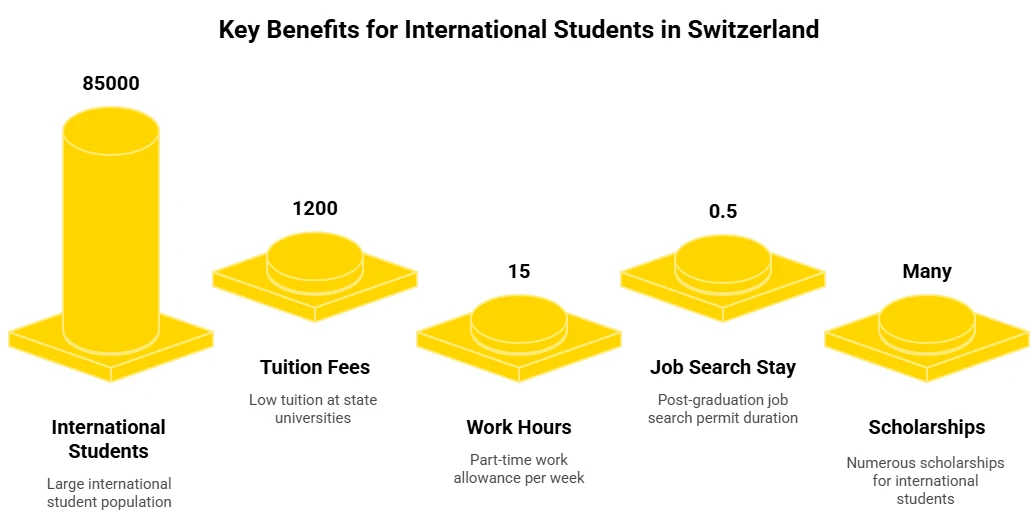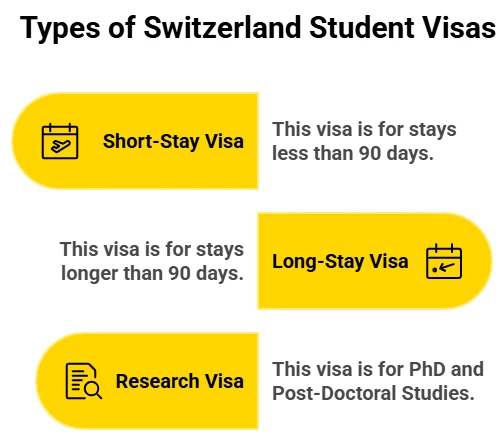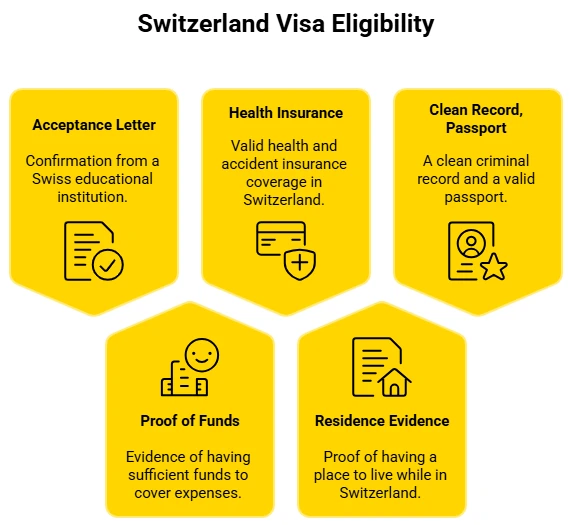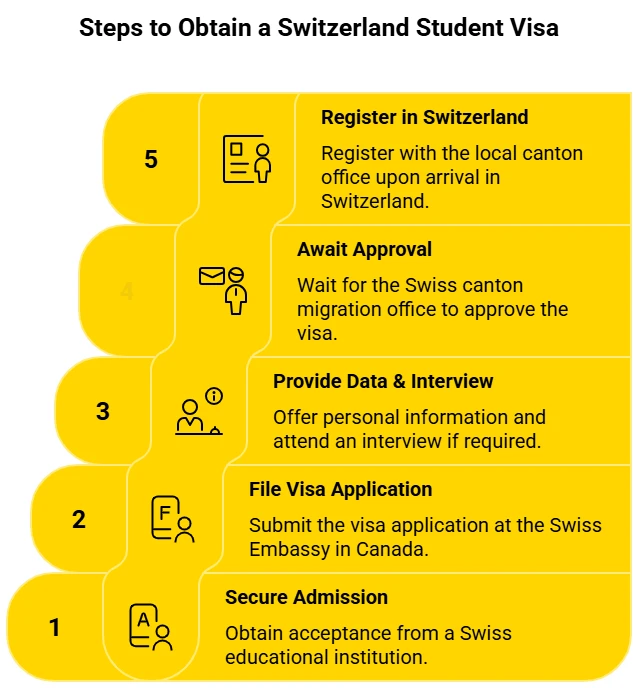Switzerland provides a distinctive chance for Canadian students to chase respected degrees in a multilingual, creative, and secure setting, complete with some of the world's top universities. It is a nice place to study abroad because it offers cheap tuition, possibilities to work while in school, and options for staying after graduation.

*Want guidance to apply for a Switzerland student visa? Sign up with Y-Axis for comprehensive support with the process.
A Switzerland Student Visa enables international students, including Canadians, to study in Switzerland for programs lasting over 90 days. This visa is required for bachelor’s, master’s, doctoral, and language courses, and it grants temporary residency. Students can work part-time, up to 15 hours a week, and have access to healthcare and other benefits. The application requires an acceptance letter from a Swiss school, proof of funds, and valid health insurance.
Some of the reasons why you should study in switzerland are given below.
The benefits of studying in switzerland are given below.
The various types of student visas offered by Switzerland are given below.

The Switzerland Short-Stay Visa (Type C) is designed for international students, including Canadians, attending courses, summer programs, language studies, or academic seminars that last fewer than 90 days. This visa allows a stay of up to three months in Switzerland. Note that part-time work is not allowed with this visa. It suits exchange students or those in cultural or prep programs. Applicants need to show proof of enrollment, money, housing, and travel insurance for the whole time they plan to stay.
The Switzerland Long-Stay Visa (Type D) is intended for international students, including Canadians, planning to pursue studies in Switzerland for over 90 days. This visa is needed for bachelor’s, master’s, and doctoral programs, as well as long-term language courses. It permits students to reside in Switzerland, hold part-time jobs for up to 15 hours each week, and use healthcare services. The application process starts with gaining acceptance into a Swiss school and showing proof of enough finances, health coverage, and housing. After they arrive, students have to sign up with their local cantonal migration office to confirm their residence permit.
The Switzerland Research Visa is for international students, including Canadians, doing PhDs, post-doctoral work, or fellowships at approved Swiss schools or research centers. It's a Long-Stay Visa (Type D) that lets you live in Switzerland as long as your research lasts. To apply, you'll need an official invite from a Swiss institution, proof you can pay your bills, health insurance, and a place to live. You can also work part-time (up to 15 hours a week) if it fits with your research.
The eligibility criteria for a Switzerland Visa are given below.

The documents required to apply for a Switzerland Student Visa are given below.
The procedure to apply for a Switzerland Student Visa is given below.
Step 1: Secure admission to a Swiss institution of higher education.
Step 2: File for a visa at the Swiss Embassy in Canada.
Step 3: Give needed personal data and go to an interview if asked.
Step 4: Wait for the approval of the Swiss canton migration office.
Step 5: When you arrive in Switzerland, sign up with the local canton office.

The detailed cost of studying in Switzerland is given below.
| Expense | Cost (CHF) | Cost (CAD Approx.) |
| Public university tuition | CHF 1,200–3,000 per year | CAD 1,700–4,300 per year |
| Private university tuition | CHF 20,000–40,000 per year | CAD 29,000–57,000 per year |
| Living expenses | CHF 1,600–2,500 per month | CAD 2,300–3,600 per month |
| Health insurance | CHF 100–200 per month | CAD 140–280 per month |
Detailed information about the scholarships offered by Switzerland to international students is given below.
| Scholarship Name | Description |
| Swiss Government Excellence Scholarships | For postgraduates and researchers, it covers tuition, stipend, and travel. |
| ETH Zurich Excellence Scholarship | Fully funded scholarships for master’s students at ETH Zurich. |
| EPFL Excellence Fellowships | Merit-based support for master’s programs at EPFL. |
| University of Geneva Excellence Fellowships | For outstanding students pursuing master’s degrees. |
| Swiss Universities Grants | Institutional scholarships for international students. |
Detailed information about the Switzerland student visa fees is given below.
| Visa Type | Fee (CHF) | Fee (CAD Approx.) |
| Short-Stay Visa (less than 90 days) | CHF 80 | CAD 120 |
| Long-Stay Visa (more than 90 days) | CHF 88 | CAD 130 |
| Research Visa for PhD and Post-Doctoral Studies | CHF 88 | CAD 130 |
Detailed information about the processing time for Switzerland Student Visa is given below.
| Visa Type | Processing Time |
| Short-Stay Visa (less than 90 days) | 2–4 weeks |
| Long-Stay Visa (more than 90 days) | 6–12 weeks (includes Canton approval) |
| Research Visa for PhD and Post-Doctoral Studies | 8–12 weeks |
Detailed information about the renewal and extension of Switzerland Student Visa is given below.
| Stage | Details |
| Current Visa | Valid for the duration of your enrolled program (up to 1 year, renewable annually). |
| Renewal/Extension | Apply at least 2 months before expiry at your local cantonal migration office. |
| Requirements for Renewal | Proof of enrollment, sufficient funds, valid health insurance, and accommodation confirmation. |
| Post-Study Options | Apply for a 6-month job-seeking residence permit to find employment in Switzerland. |
The possible challenges and the tips to have a successful Switzerland Student Visa application are given below.
| Challenge | Tip for Success |
| Proving financial stability | Provide official bank statements or notarized sponsorship letters. |
| Delays in cantonal approval | Apply 3–4 months before your program begins. |
| Incomplete insurance coverage | Ensure your policy meets Swiss federal standards. |
Y-Axis is a leading study abroad consultancy service that aids Canadian students in their pursuit of education in Switzerland. We offer help with university selection and visa processing, guiding students through each step to support a trouble-free experience.
Our services include:
Support after arrival to help students adjust to life in Switzerland.
Yes, you can work part time on a Switzerland student visa. Students with Long-Stay Visas are allowed to work part-time, up to 15 hours per week, while classes are in session. They can work full-time during semester breaks. Students must notify their cantonal migration office before they begin working. Employers are responsible for getting work authorization for any student they hire. While part-time income can help offset living costs, it's usually not enough to cover all expenses. Many jobs, especially outside of big cities, require fluency in French, German, or Italian.
The cost of studying in Switzerland is given below.
| Expense | Cost (CHF) | Cost (CAD Approx.) |
| Public university tuition | CHF 1,200–3,000 per year | CAD 1,700–4,300 per year |
| Private university tuition | CHF 20,000–40,000 per year | CAD 29,000–57,000 per year |
| Living expenses | CHF 1,600–2,500 per month | CAD 2,300–3,600 per month |
| Health insurance | CHF 100–200 per month | CAD 140–280 per month |
Yes, Switzerland offers multiple scholarships for international students. Some of the popular scholarships for international students are given below.
| Scholarship Name | Description |
| Swiss Government Excellence Scholarships | For postgraduates and researchers; covers tuition, stipend, and travel. |
| ETH Zurich Excellence Scholarship | Fully funded scholarships for master’s students at ETH Zurich. |
| EPFL Excellence Fellowships | Merit-based support for master’s programs at EPFL. |
| University of Geneva Excellence Fellowships | For outstanding students pursuing master’s degrees. |
| Swiss Universities Grants | Institutional scholarships for international students. |
The different types of Switzerland student visas are given below.
All visas require an acceptance letter, proof of funds, housing details, and health insurance. Processing times may vary, and long-stay and research visas must be approved by the respective canton.
The processing times for a Switzerland student visa are given below.
| Visa Type | Processing Time |
| Short-Stay Visa (less than 90 days) | 2–4 weeks |
| Long-Stay Visa (more than 90 days) | 6–12 weeks (includes canton approval) |
| Research Visa for PhD and Post-Doctoral Studies | 8–12 weeks |
Yes, you can stay in Switzerland after graduation. After finishing their studies, international students have the option to apply for a 6-month residence permit that allows them to seek employment opportunities in Switzerland. If they find a job that aligns with their field of study, they can then switch to a Swiss work visa (B permit) for long-term employment. Graduates with skills in areas like hospitality, finance, and engineering are especially sought after. Being proficient in French, German, or Italian can help improve job prospects and integration into the Swiss job market. Remember to submit the application for the job-seeking permit before the student visa expires.
No, it is not mandatory to know French or German language to study in Switzerland. Many universities in Switzerland have programs taught in English, mostly for graduate students. Still, it's a good idea to learn French, German, or Italian for living, internships, and jobs. Some bachelor's degrees might want you to know a bit of a national language. To get into English programs, you may need to pass an English test like IELTS or TOEFL. If you know the local language, it can also help you get part-time work and find a job after you graduate in Switzerland.
To apply for a Switzerland student visa, you have to provide the documents given below.
Yes, you can bring your family while studying in Switzerland. Family reunification is an option for spouses and children, but its approval depends on financial resources, housing availability, and the canton's decision. Applicants need to show they can financially support their dependants and provide valid health insurance. Dependants have limited work rights and need separate approval to work. Students in longer programs like PhDs have a better chance of getting family reunification than those in bachelor's programs.